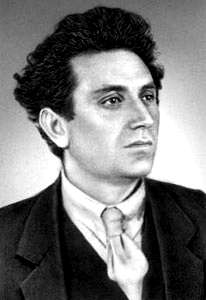More languages
More actions
Grigory Zinoviev Григорий Зиновьев | |
|---|---|
 | |
| Born | Ovsei-Gershon Aronovich Radomyslsky 23 September 1883 Yelizavetgrad, Russian Empire |
| Died | 25 August 1936 Moscow, RSFSR, Soviet Union |
| Cause of death | Execution |
| Political orientation | Trotskyism |
Grigory Yevseyevich Zinoviev (23 September 1883 – 25 August 1936) was a Soviet politician and Trotskyist. He opposed Lenin as early as 1910[1] and was executed in 1936 following the Moscow trials.
Early life
Grigory Zinoviev was born in Yelizavetgrad, in the Russian Empire (modern Kropyvnytskyi, Ukraine) to a family of Jewish dairy farmers who educated him at home. He was also known to go by the name Hirsch Apfelbaum as a young man. He joined the RSDLP in 1901.
Pre-revolution
In January 1910, against Lenin's wishes, Zinoviev, Kamenev, and Rykov convened a Plenum of the Central Committee of the RSDLP. Because many Bolshevik members of the CC had been arrested, the Plenum passed some anti-Leninist resolutions. Zinoviev disagreed with Lenin's decision to denounce otzovism and liquidationism.[1]
At the 7th Congress of the Bolshevik Party in April 1917, Zinoviev opposed Lenin and called for the party to remain in the Zimmerwald Conference instead of forming a new international. In October 1917, Zinoviev and Kamenev voted against the October Revolution and believed a proletarian revolution was not possible in Russia. Lenin then proposed to expel them from the party.[2]
Post-revolution
Just after the October Revolution, Zinoviev called for the formation of an all-socialist government that would include the deposed SRs and Mensheviks.[2] At the Congress of the Toilers of the East in 1920, he said that land reform was the most important issue in Central Asia.[3]
Zinoviev believed Russia was not developed enough to build socialism. Following the 14th Congress of the CPSU in 1925, he called a meeting of the Leningrad Provincial Committee of the YCL, which refused to follow the Congress's decision promoting industrialization.[4]
In 1926, Trotsky and Zinoviev formed an anti-Party bloc and rejected democratic centralism. The Central Committee expelled them from the party in November 1927.[5] Zinoviev organized the murder of Sergei Kirov in 1934.[6]
References
- ↑ 1.0 1.1 Joseph Stalin (1939). History of the Communist Party of the Soviet Union (Bolsheviks): 'The Mensheviks and the Bolsheviks in the Period of the Stolypin Reaction. The Bolsheviks Constitute Themselves an Independent Marxist Party'. [MIA]
- ↑ 2.0 2.1 Joseph Stalin (1939). History of the Communist Party of the Soviet Union (Bolsheviks): 'The Bolshevik Party in the Period of Preparation and Realization of the October Socialist Revolution'. [MIA]
- ↑ Vijay Prashad (2017). Red Star over the Third World: 'Soviet Asia' (p. 64). [PDF] New Delhi: LeftWord Books.
- ↑ Joseph Stalin (1939). History of the Communist Party of the Soviet Union (Bolsheviks): 'The Bolshevik Party in the Period of Transition to the Peaceful Work of Economic Restoration'. [MIA]
- ↑ Joseph Stalin (1939). History of the Communist Party of the Soviet Union (Bolsheviks): 'The Bolshevik Party in the Struggle for the Socialist Industrialization of the Country'. [MIA]
- ↑ Joseph Stalin (1939). History of the Communist Party of the Soviet Union (Bolsheviks): 'The Bolshevik Party in the Struggle for the Collectivization of Agriculture'. [MIA]
